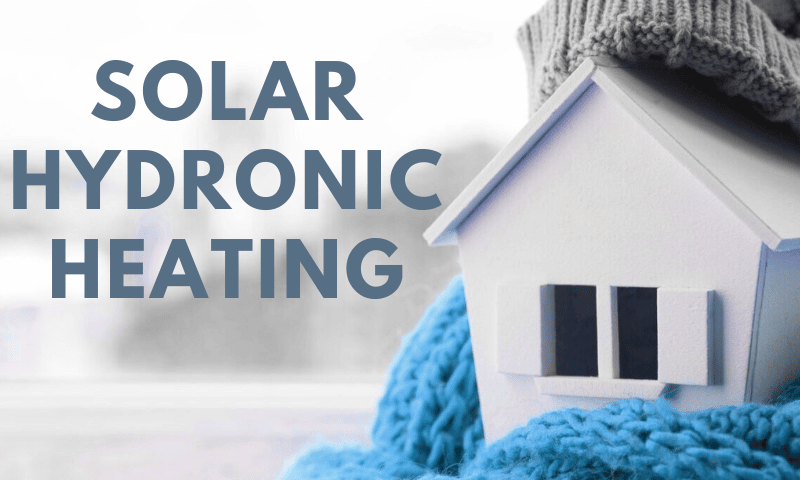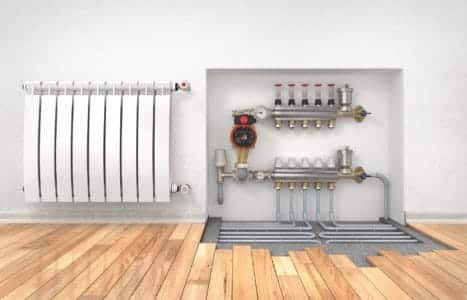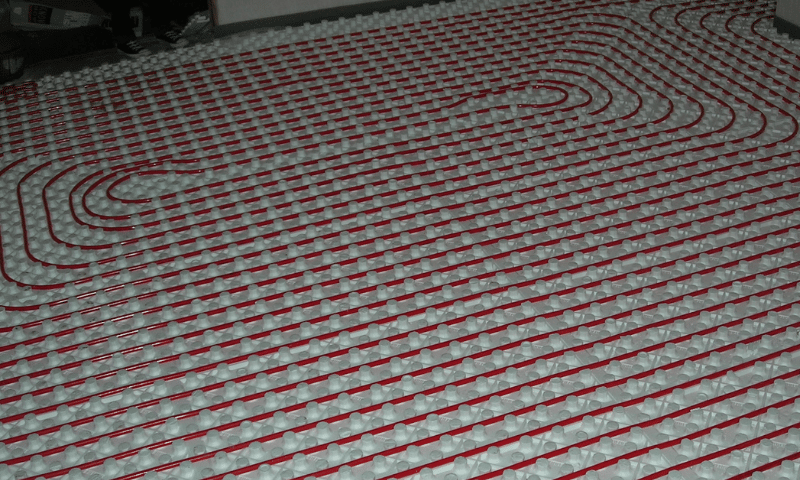
A home, store, or any other building can be heated with solar hydronic, also known as radiant floor heating or slab heating.
It is adaptable and cosy to warm the surfaces inside the house. The solar hydronic heating systems pump water through tubing in the floors or pipes to radiators and convectors along the walls.
Solar Hydronics uses solar energy’s advantages and financial savings to help power your heating and hot water systems. You may do this to cut your carbon dioxide emissions and lower your environmental impact and your energy costs.
On this page
How does hydronic heating work?
The space is heated when warm water or fluid is circulated through panel radiators or tubing on a radiant floor. Solar collectors first heat the water/fluid. The heated fluid is pumped to a heat source, such as panel radiators, skirting board convectors, underfloor pipes or walls, where the heat is released and then returned to the solar collector for re-heating. Electric, natural/LPG gas or solid fuel boilers may use as a backup at night or on overcast days.
The piping transfers heated water from the boiler to radiators or convectors and then back for reheating. It is typically made of copper, plastic, or multilayer. Water is circulated through the pipework using a pump.
Programmable wall thermostats control ideal heat levels (or room temperatures) to maximise home comfort.
Check out our page to learn more about solar hydronics.
Designs for hydronic heating systems
Hydronic heating systems can be divided into two types: those which generate heat from wall-mounted sources and those that circulate hot water through a home’s floor.
Standalone hydronic heating systems

A typical hydronic heating radiator is installed on an Australian home’s wall. These heat-producing systems might use one radiator or numerous radiators around the building.
Hydronic radiant floor heating

The efficient way to transmit energy throughout your home is by using in-floor or “trenched” radiant floor hydronic heating systems. Hot water moving through the extensive network of pipes will heat your floors and radiate across the rooms as warm air rises.
Where is hydronic heating beneficial?
A solar hydronic heating system is frequently used in residential and commercial settings where a consistent heat supply is needed.
Solar hydronic heating is appropriate for various specialised applications where steady radiated heat is necessary. Therefore, its uses are wider than maintaining homes and offices at a comfortable temperature.
The greenhouses can use solar hydronic heating, which warms water that is cycled through a pipe that is best placed around the walls of the building and/or in between plant rows.
Solar hydronic heating can be employed wherever warmth is required in agriculture, such as in chicken sheds and piggies, to protect and promote the growth of young animals.
Running costs for solar hydronic heating in Australia
Like any other heating method, solar hydronic heating has a range of prices depending on many variables. The hardware price is declining as hydronic heating becomes more widely used in Australia.
Boiler type
Depending on the boiler type and heat source you choose, prices may change. Consider ecologically friendly fuel sources when considering and discussing different boiler kinds.
Radiant Heat Emitter
After the water has been heated, its thermal energy is delivered to the building via a heat-emission system. It is now normal to put one or more radiators on the walls of a dwelling
Pipe system installation
Your home’s layout and heating needs will determine how complicated a pipe system or network is needed. The associated expenditures may increase due to the need for in-floor heating during renovations.
Other factors
The size of your house or building, the solar panels you choose, and the installation and design-related costs.
Benefits of hydronic heating
Spend some time weighing the advantages of your selections. Many homes or businesses can benefit from a solar hydronic heating system.
Hydronic heating systems consume much less energy than ducted heating systems and are, therefore, more environmentally friendly. Your heating system’s actual carbon emissions decrease.
Since solar energy doesn’t cause emissions of greenhouse gases, it is also the greenest form of energy.
2.Cost-effective solutions
Using a hydronic heating system allows you to reduce your energy costs. They can be used as and when needed, helping you to save money.
Furthermore, using a WIFI or programmable thermostat, you can control the room’s temperature owing to modern technology. As a result, you can lower the temperature while the room is empty and only heat it when necessary. You conserve energy as a result, which lowers your energy costs.
3. Healthy option
Solar hydronic systems do not produce aeroallergens and other byproducts. Better and healthier air is available for breathing. Hydronic heating warms with less air movement, so there is less dust and allergens, making it ideal for anyone with allergies or asthma.
4. Energy efficiency
Solar hydronic heating is one of the most energy-efficient ways to heat your home. They are at least 20 to 25% more energy-efficient than forced-air heating systems. This is because the heat is dispersed evenly across the space, reducing the need to overheat it to make up for chilly patches. Additionally, because it doesn’t rely on ducting that may leak heat, radiant floor heating is particularly effective.
5. No noise
In most cases, hydronic heating systems are silent, allowing you to relax in peace at the office or at home.
There aren’t any fans blowing hot air, so there aren’t any draughts or noises, just quiet, cosy warmth. The pump inside the boiler, used to circulate water, is the only component with moving parts.
6. Reliable & safe
Even children and animals can safely handle these gadgets. Additionally, they are completely dependable because you may install them and leave them alone for a while.
Since they are entirely sealed, hydronic heating systems have no exposed flames or electrical connections. Water is heated and circulated at a safe, low pressure through a network of pipes, valves, manifolds, and switches, all of which must function together to heat the designated areas. In areas frequently used by youngsters or the elderly, this temperature can also be adjusted. A youngster can be left in front of a heater in the safest possible situation because there are no exposed flames or electrical connections.
Your family is safe thanks to hydronic heating. Such solutions eliminate the possibility of electrical harm and the risk of a wood-burning fire.

7. Individual Control
The heat can be turned on, off, or increased or decreased with a button on each radiator. To provide the comfort you need and to reduce your gas expenditure, living areas can be made warmer than bedrooms, and rarely can used rooms be shut off.
Controls and thermostats can be used to maintain the temperature at the desired level regardless of the weather outside. Temperature fluctuations are prevented by judiciously changing the heating system’s operation to account for variations in inside and exterior temperatures. These kinds of controls improve the systems’ ability to be energy efficient.
Solar hydronic is the future of heating
Systems for solar hydronic heating give you a quieter, cleaner, and a safer environment free of draughts and noise. Your home will be heated more naturally and evenly using free solar energy. The highest-grade solar hydronic heating systems increase your property’s comfort and market value. A solar hydronic heating system that doesn’t move much air and dust will undoubtedly help people with allergies and asthma. Your home’s heat may be more precisely managed and given when and when you need it. Solar hydronic heating is undoubtedly your top pick because it offers the highest levels of comfort and efficiency.
Trust a skilled team of installers to walk you through the design and installation process to ensure your system functions flawlessly and allows you to access helpful support anytime you need it.
Energy Matters has been a leader in the renewable energy industry since 2005. Contact us, and we can connect you with our trusted local solar installers in Melbourne, who will provide up to 3 FREE solar quotes for your home and business solar energy system.
Complete our quick quiz and begin your solar journey for your business today!










































